The Fiji expedition cruise that'll teach you lessons in happiness
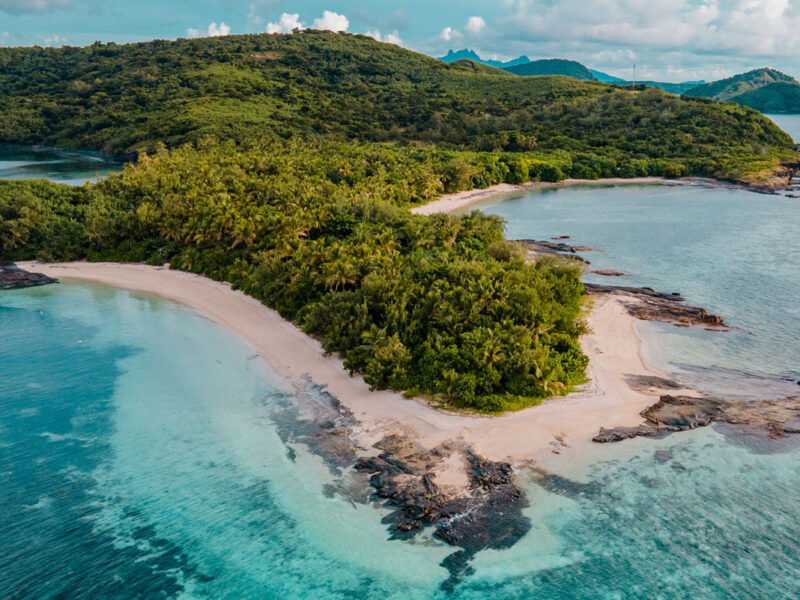
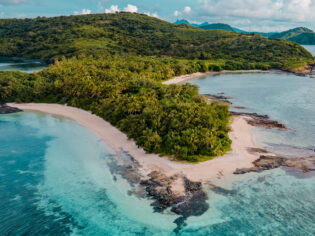
Drawaqa Island provides some of the best snorkelling on the cruise. (Image: Rani Zerafa via Getty Images)
An expedition cruise in the Northern Yasawa Islands provides a deeper connection to Fiji that goes beyond poolside cocktails and paradisiacal beaches.
A dinghy emerges from around the bay and is headed towards us, to this empty beach some 87 kilometres north of Viti Levu. I’m standing knee-deep in translucent water, mottled with the dark patches of reef beneath its surface. A school of small white fish scuttles past. The boat draws my attention though: it’s the first I’ve seen out here in three days.
A family of eight from nearby Navotua Village spill out of the dinghy and onto the sand. They settle in a shady spot and carefully place trinkets on a mat and hang sulus (sarongs), bula shirts and traditional tapa cloth prints in the palm trees. Known locally as masi, these intricately patterned tapa cloths are made exclusively by the women of this region using the bark of the paper mulberry tree and natural dyes.
Seek moments of solitude
We’re on Nacula Island, one of about 20 in the Yasawa Islands, a volcanic archipelago that stretches for more than 80 kilometres north-west of the Fijian mainland. The remote region was flung into the spotlight in 1980 when the movie The Blue Lagoon was filmed on Turtle Island, just south of here, and its owner began to welcome guests to the property. Until then, this part of the world was closed to tourists.
In the four decades since, many simple family-run lodges, homestays and a few large resorts were built and island-hopping day trips began to operate from the mainland. But despite these new developments, the Yasawa Islands have largely remained unchanged by tourism. There are no buildings higher than a spindly coconut palm, no general stores or markets – except for this unexpected pop-up on Nacula Island.
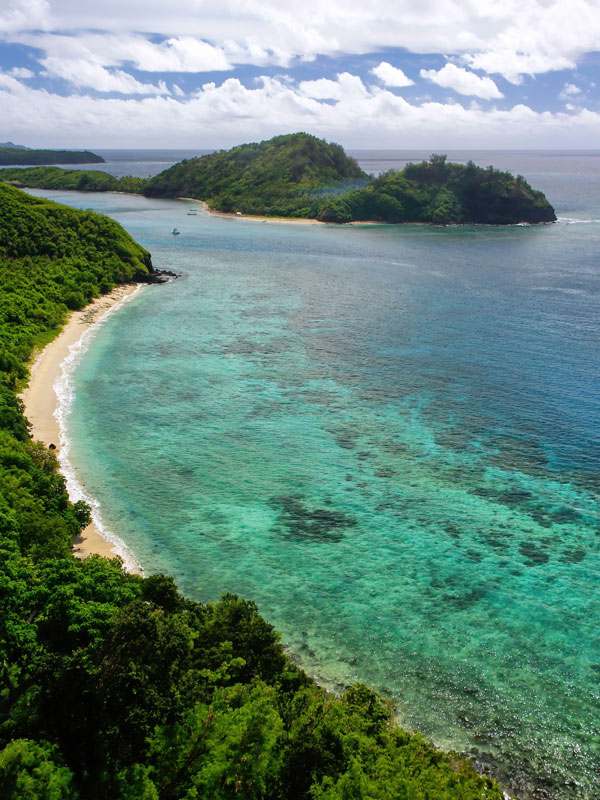
The remote Yasawa Islands remain largely unspoilt. (Image: Alamy/Don Mammoser)
Find authentic connection
Despite being difficult to reach, we’ve covered a lot in the past three days onboard MS Caledonian Sky with Captain Cook Cruises Fiji. Since 1997, the Australian-owned company has been navigating remote pockets of Fiji that most have never seen. Resplendent in dark wood panelling and brass features – with Fijian tapa, weavings and historic sepia photographs of island villages and locals adorning its walls – this boutique ship feels traditional and homely, sleeping just 114 guests.
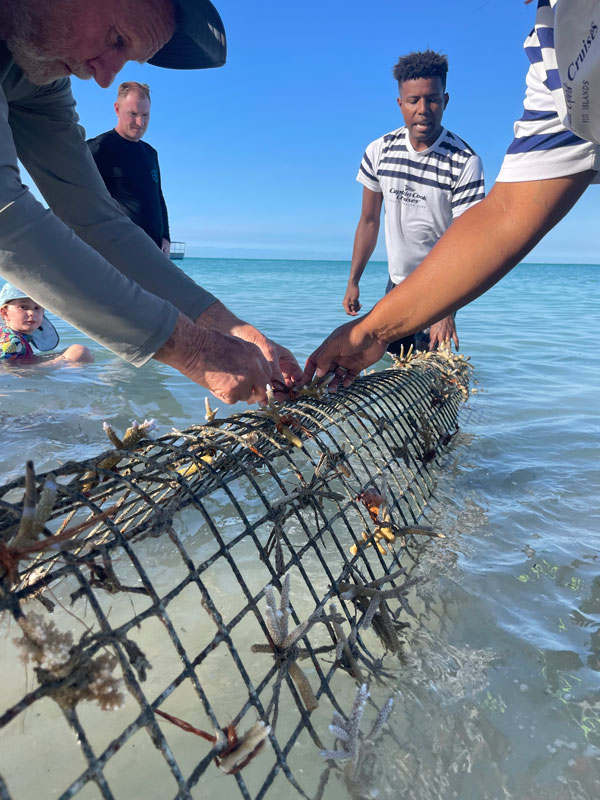
Planting coral on Tivua Private Island to regenerate the reef.
So far, we have waded with black-tip reef sharks on Tivua Island, privately owned by Captain Cook Cruises Fiji, where we had the opportunity to plant a coral frag to help rejuvenate the surrounding reef. To date, this eco-initiative has seen almost 10,000 frags planted as part of the Buy a Coral – Build a Reef program.
On Naviti Island, we paddled over coral gardens in a clear-bottomed kayak with Ratu Rabeka Drauna, one of the ship’s marine biologists. And we visited a primary school in Yaqeta Village, where we spoke to the principal about the plight of losing the Fijian language and traditions to modernisation.
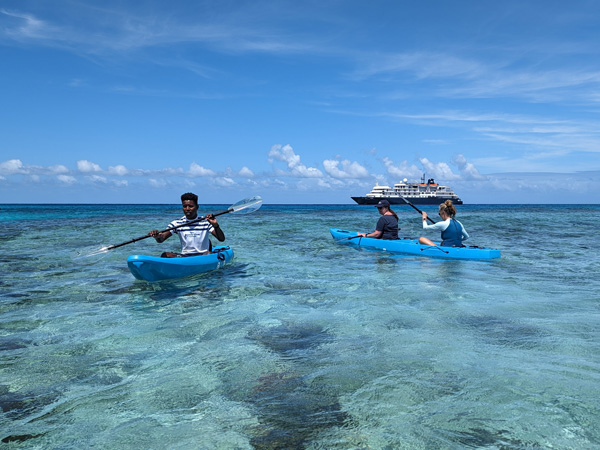
A clear-bottomed kayak with one of Captain Cook Cruises Fiji’s marine biologists, Ratu. (Image: Megan Arkinstall)
Since the pandemic, tourism in Fiji has rebounded at a rapid rate. But there has also been a shift in purpose, with more than half of all travellers expressing a desire to experience authentic Fijian culture beyond resorts. Here in the Yasawa Islands, this genuine connection is possible, with some 27 isolated villages retaining a lifestyle rooted in tradition.
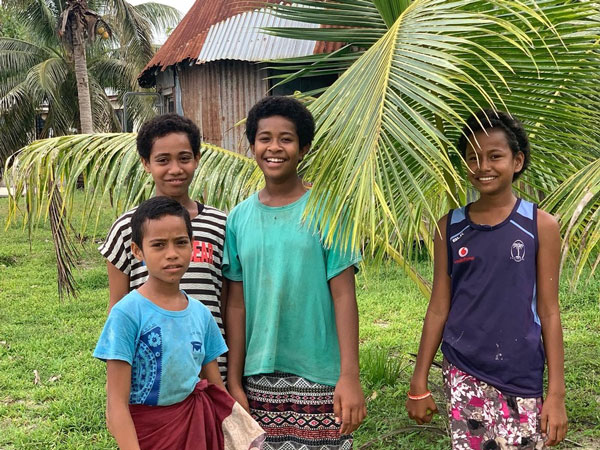
Locals welcome us to their villages.
Captain Cook Cruises Fiji has a long-standing relationship with these villages. Manasa Tuilakeba, one of the expedition team’s cultural experts and onboard entertainer, acts as core ambassador to these communities. Before guests disembark at any village, he heads there first by zodiac for a sevusevu ceremony, during which he presents the village chief with a gift, usually kava root, and asks permission for us to visit.
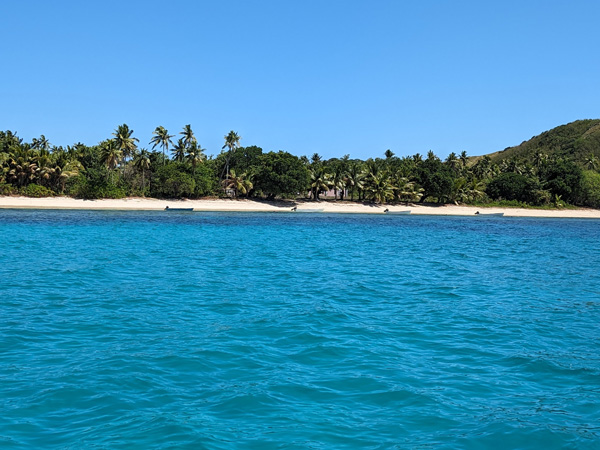
Yaqeta Island, as seen from a zodiac. (Image: Megan Arkinstall)
Surround yourself with joy
We witness this ceremony for ourselves at Matacawalevu Village, home to some 200 people. The exchange takes place just beyond the palm-fringed beach, in the central village green dotted with flowering frangipani trees and encircled by humble homes and buildings; some have roofs held down by concrete blocks, others are empty shells. A lovo (Fijian feast cooked in an earth oven) is served and we help ourselves to an array of foods such as fish, sweet potato and spinach cooked in coconut cream. We eat our meals on camp chairs with village dogs sitting optimistically by our feet. Later, under a blushing sky, the local adults perform a meke (song and dance) during which the male dancers startle us with virile movements and sing the popular farewell song Isa lei, raising goosebumps on my arms.
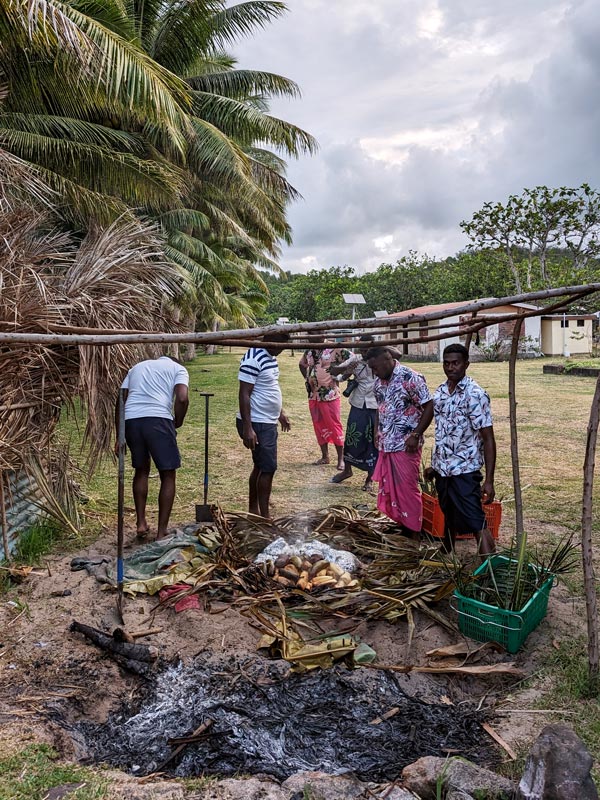
The crew cooking a lovo for guests in Matacawalevu Village. (Image: Megan Arkinstall)
Unlike past holidays spent in a resort on the mainland, I don’t tap in and out of the cultural immersion on this trip. For the mostly Fijian crew, MS Caledonian Sky is their temporary home, their floating village, and we are welcomed as friends into their tight-knit community. As anyone who has ever been to Fiji will know, a warm and welcoming disposition is part of their cultural makeup. Joy is the default mood; humour is sprinkled throughout every interaction. The crew teaches us Fijian phrases, informs us about local history and ecology, and enlightens us with personal anecdotes. They give us lessons in cultural heritage and, incidentally, lessons in happiness, too.
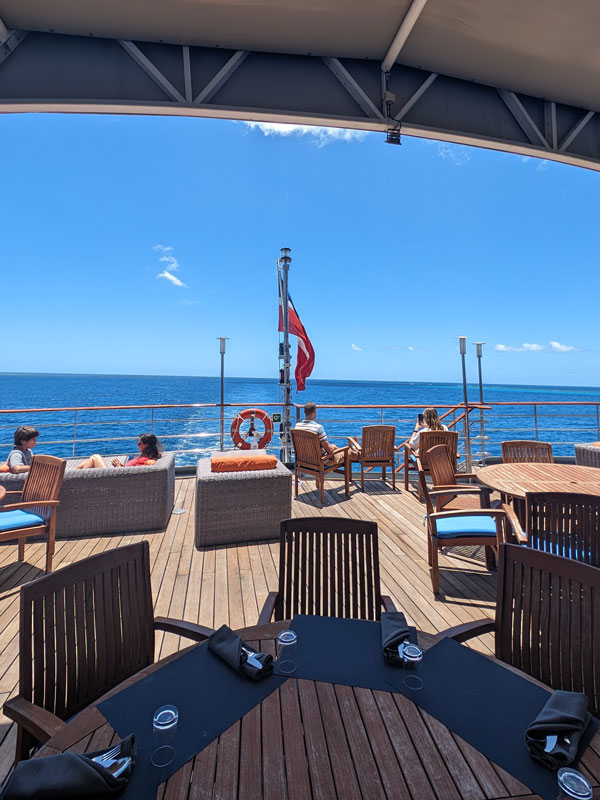
Relax on the Lido Deck of MS Caledonian Sky. (Image: Megan Arkinstall)
Immerse yourself in nature
Of course, a highlight is the gobsmacking natural beauty of the region, both above and below the dreamy turquoise water. Fiji is known as the soft-coral capital of the world; it’s part of the exceptionally biodiverse Great Sea Reef (GSR) region, the third-largest barrier reef in the world, and we spend much of our time in swimsuits.
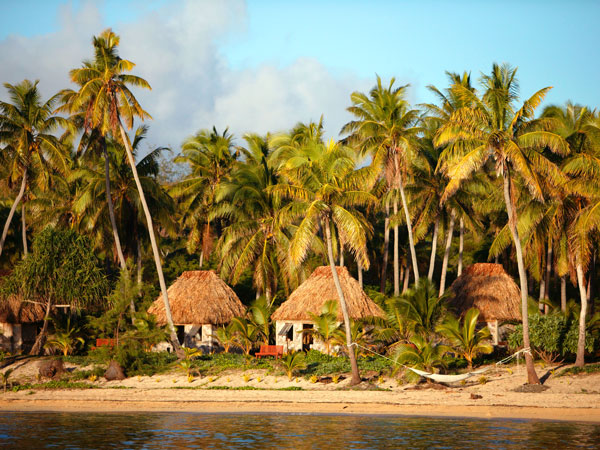
Life here is rooted in tradition. (Image: Alamy/Chris Mclennan)
On Drawaqa Island’s sun-drenched ‘Barbecue Beach’, I flipper over seagrass to see branching staghorn corals with electric blue and hot-pink tips; chunky brain corals and blue starfish; vast table corals and swaying anemones, where tropical fish play hide and seek. While there’s plenty to marvel at, it’s hard to ignore that parts of the reef are clearly suffering.
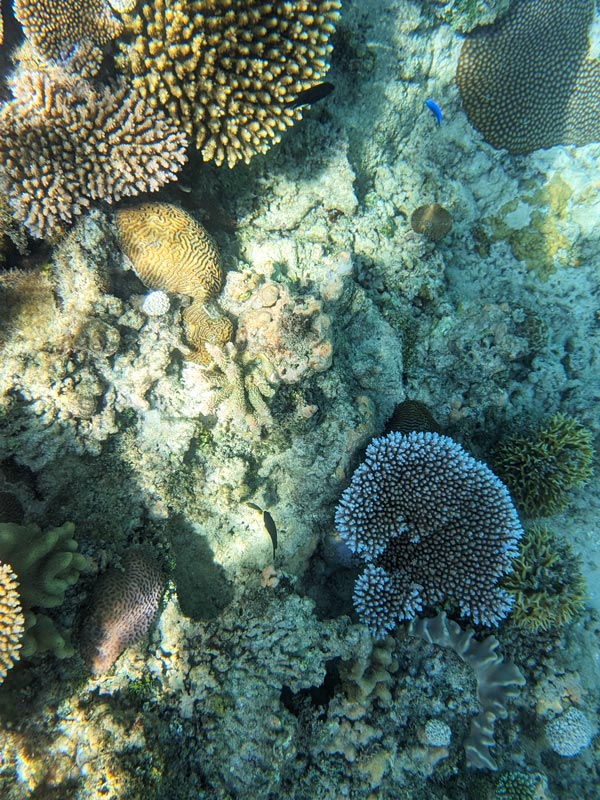
Fiji is renowned for being the world’s soft coral capital. (Image: Megan Arkinstall)
Marine biologist Ratu assures me, however, that the crackle I hear underwater is the sound of life: fish and crabs feeding and moving. He tells me that scientists played audio recordings of a healthy reef system in patches of dead coral in the Great Barrier Reef [in 2019] to help kickstart natural recovery by luring in new fish life. In 40 days, the number of fish doubled at the site. I go back under to listen again to the hopeful crackle of life.
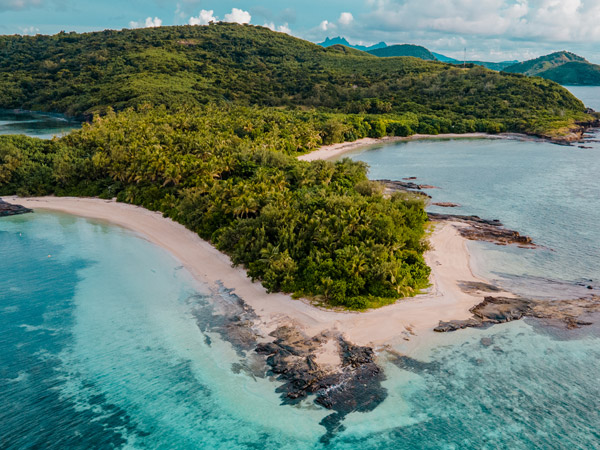
Drawaqa Island provides some of the best snorkelling on the cruise. (Image: Rani Zerafa via Getty Images)
Practice gratitude
After four nights, our hearts and memories are full with remarkable experiences. We swam in Sawa-i-Lau, the limestone cave made famous by The Blue Lagoon; joined the Pacific Plunge, where guests can jump off the back of the ship into the middle of the Pacific Ocean; and had many deserted beaches completely to ourselves.
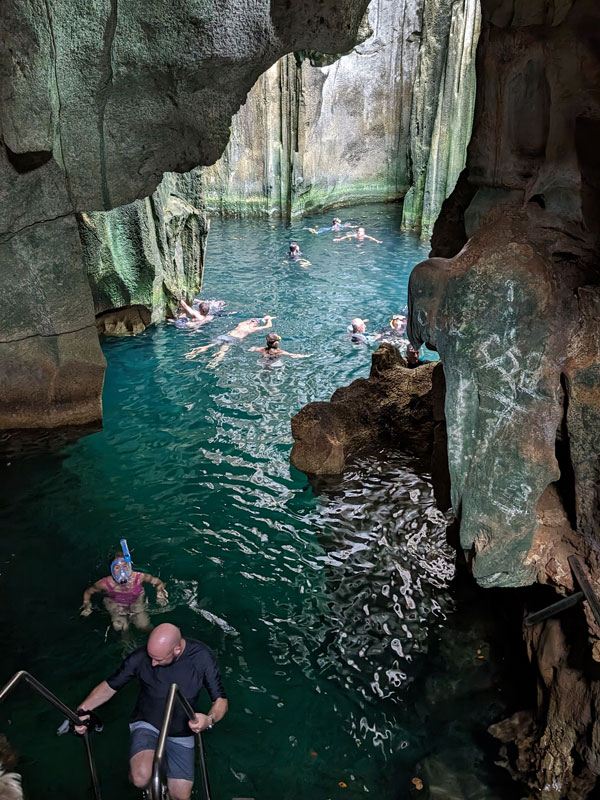
Taking a dip in Sawa-i-Lau cave. (Image: Megan Arkinstall)
It’s the people I remember most fondly, though. After our school visit, a group of fully clothed children run behind our zodiac into the sea. They wave and call out moce (‘goodbye’, pronounced mo-thay), splashing each other with delight. Their bright smiles are etched into my memory. So too are the melodic voices that sang to us throughout our time – the crew, as they welcomed us onboard; the children, as they welcomed us to their school; the villagers as they welcomed us to their home. It was an experience akin to kava for the soul.
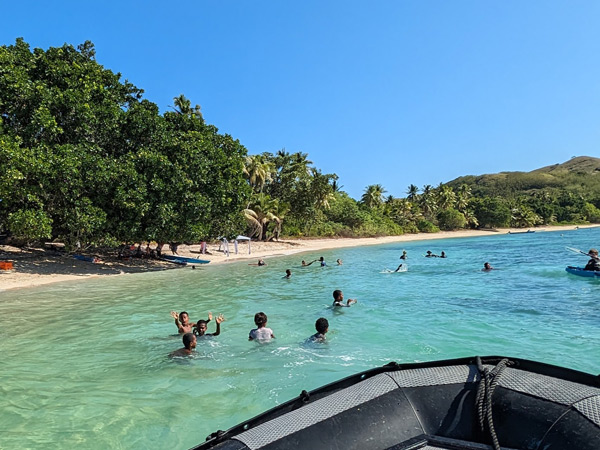
Children from Yaqeta Village enjoy swimming after school (Image: Megan Arkinstall).
A Traveller’s Checklist
Getting there
Fiji Airways flies direct from Sydney, Melbourne, Brisbane, Adelaide and Canberra to Nadi.
Playing there
Captain Cook Cruises Fiji regularly operates the four-night Northern Yasawa Islands itinerary throughout the year. It can be combined with a three-night Mamanuca and Southern Yasawa Islands itinerary. Check-in is at Denarau Island with a transfer to the departure port of Lautoka included.
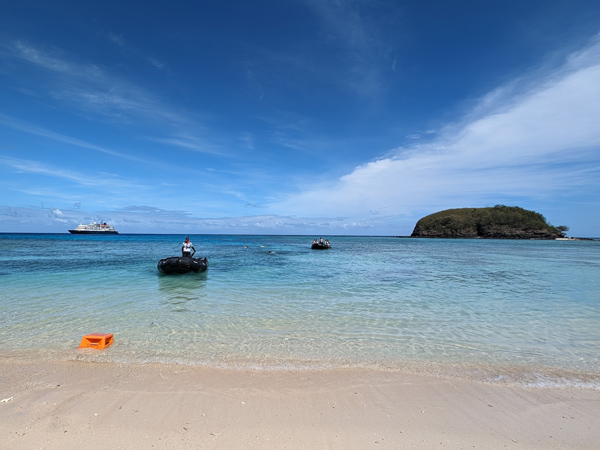
Immerse yourself in Fiji’s tropical paradise. (Image: Megan Arkinstall)
Staying there
The MS Caledonian Sky is a 114-passenger expedition ship, with all suites offering ocean views either from portholes, windows or private balconies. All meals, shore excursions, onboard lectures and more are included.
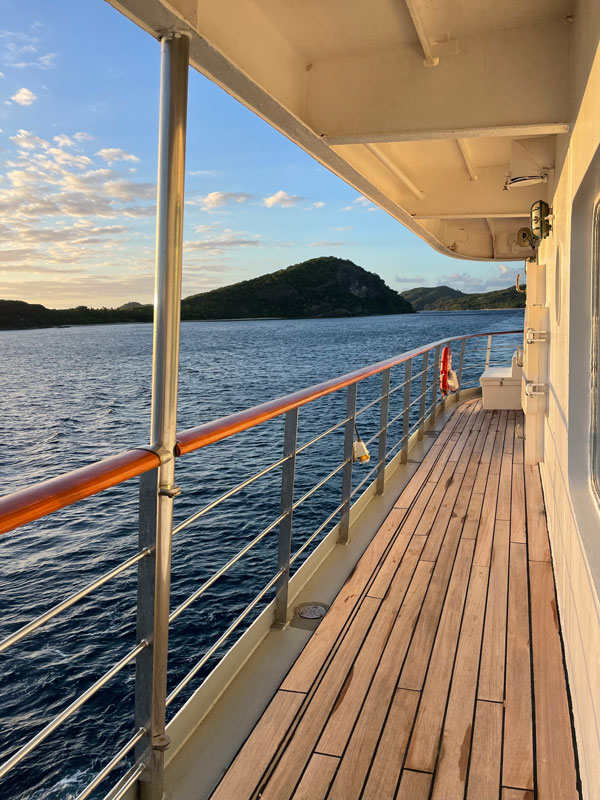
Catch the sunrise in the Yasawa Islands onboard MS Caledonian Sky.
Spend the night on Denarau Island before your cruise or tack on a few days beforehand, like we did, at the InterContinental Fiji Golf Resort and Spa on the white-sand Coral Coast, an hour’s drive south of Nadi.
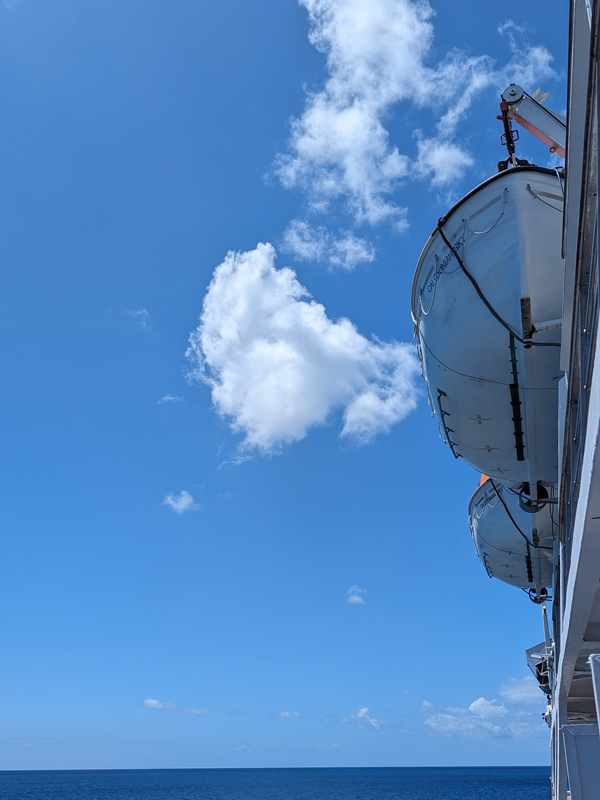
Sky above and sea below from a premium balcony suite. (Image: Megan Arkinstall)
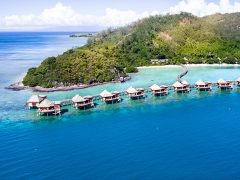
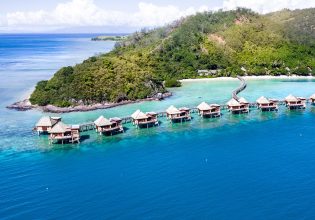
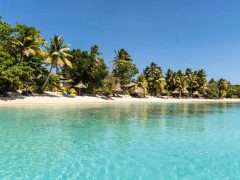
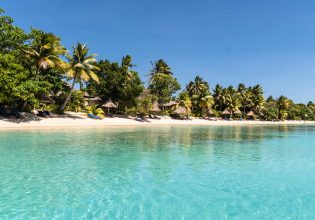
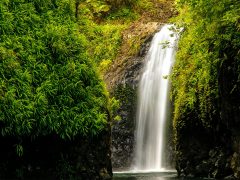
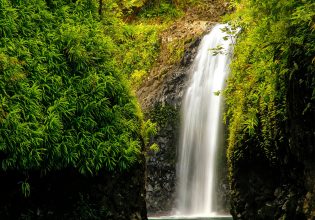
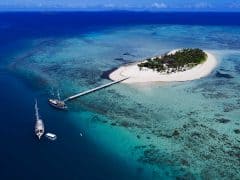
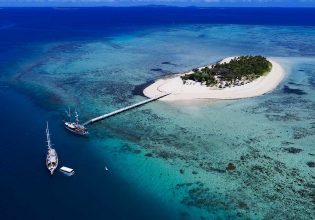
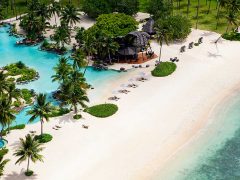
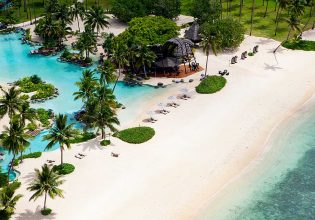

LEAVE YOUR COMMENT